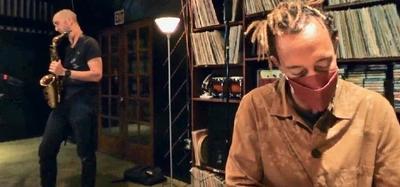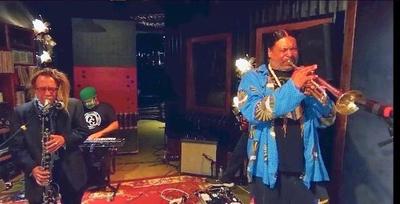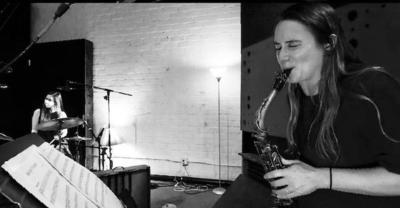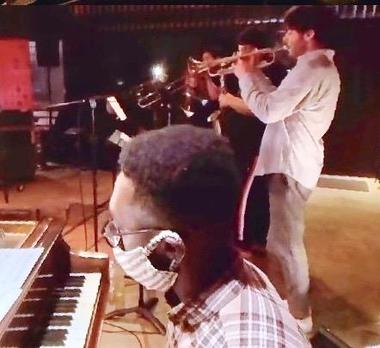Paul Cornish Sextet
It ain't easy to conjure your own piano thing, but Houston-bred Paul Cornish has done it. Maybe because of its proximity to New Orleans, Houston has spawned quite a few jazz originals -- Horace Tapscott, Jason Moran, Billy Harper, Eric Harland. Young Cornish, who has lived in Los Angeles for six years, achieves his individuality through rhythm.
The factor that shone most in Cornish's suite (commissioned by L.A. Jazz Society) is insistent hesitation, if that contradiction may be permitted. It happened when a few strong notes were followed not by another expected note, but by a pause that invited us to wait . . . and consider. Although that must have been a challenge for Cornish's sextet, especially drummer Christian Euman and bassist Logan Kane, they didn't sweat even in the concluding segment, wherein the drums had to switch to doubletime in a ponderous 5/4 meter.
Cornish's brambly composition, ranging in feel from energetic to funereal, was studded with pushbacks from the horn section of trumpeter Aidan Lombard, trombonist Jon Hatmiya and alto saxist Devin Daniels, with Daniels' solos showing special overblowing skill and unusual tone. We heard a bit of Monk and Cecil Taylor from Cornish, but his playing switched easily from rippling melody to harmonic clash. A poem by Brandon Alexander Williams rang clear with contemporary references, hip-hop rhythms and cool rage.
And as we all know, if you're not angry, you're not paying attention.

Steve Lehman & Gerald Clayton
Those who have witnessed pianist Gerald Clayton with Charles Lloyd or alto saxist Steve Lehman with Vijay Iyer will not be surprised at how well they commune.
Never too far apart to begin with, Lehman and Clayton move toward each other as a duo -- Lehman normally more avantish, Clayton normally more melodic. Taking off on compositions by Andrew Hill, Wayne Shorter and Kenny Kirkland, Lehman emphasizes his boppish side, while applying a plangent vibrato like chocolate mousse; Clayton explores infinite harmonic possibilities, his two hands mostly crowding the keyboard's low end. For rhythm, Lehman sometimes imitates drums by thrumming on muted pads; Clayton provides the bass and a clean percussive touch.
So you get all the features of a quartet from two dudes. Plus intellect, plus soul. That should do it.

Josef Leimberg & the Astral Orchestra
You might need to play this every day, just for your spirit's sake.
If Miles Davis was a dark magus, L.A. trumpeter Josef Leimberg (Kendrick Lamar, Erykah Badu) is a light magus, coalescing his Astral Orchestra with elements similar to '70s Miles, but with a peaceful, elevated aesthetic replacing the moody shadows. Rarely will you find seven musicians so perfectly tuned in to a central vibe: hippie-garbed Leimberg on suggestive trumpet or twittering twin wooden flutes; Matthew Little twinkling on spacy keyboards; Anand Bennett plucking wide-open lines on electric guitar; Bubby Lewis pulling sensual tones from a six-string electric bass. Drummer Will Logan supplies an effortless and spontaneous framework, while bearded saint Carlos Niño enriches the space with shakers and bells like incense smoke -- the mere sight of Niño anywhere makes you want to respirate.
Listeners who can't get enough may want to connect with Leimberg's 2016 "Astral Progressions," here.

Tina Raymond Quartet
Drummer Tina Raymond's arrangements of political songs struck resonant chords and discords.
Neil Young's "Ohio" at first emphasized mourning rather than its original rage via the somber harmonies of tenor saxist Andrew Conrad and alto saxist Beth Schenck, then rose to constricted fury during Schenck's commanding solo. On the spiritual "Oh Freedom," Schenck turned to fluid lyricism as Dave Tranchina's bass and Raymond's drums thumped into a determined stride.
Raymond's take on "The Battle Hymn of the Republic," which she said she put together after the 2016 presidential inauguration, penetrated on conceptual and emotional levels. Against Raymond's military paradiddles, we heard fragmented melody and sax duality, coming from a place where the twain never meet. After the conflict sagged to a stop, Raymond glanced at the camera and made a downward gesture over her plague mask -- falling tears.
Raymond drummed with facility, creativity and ease. Also, you will enjoy her psychedelic pants.
* * *
Deal of the decade: You can watch all 12 of this year's Angel City presentations for $20 by ordering here.

